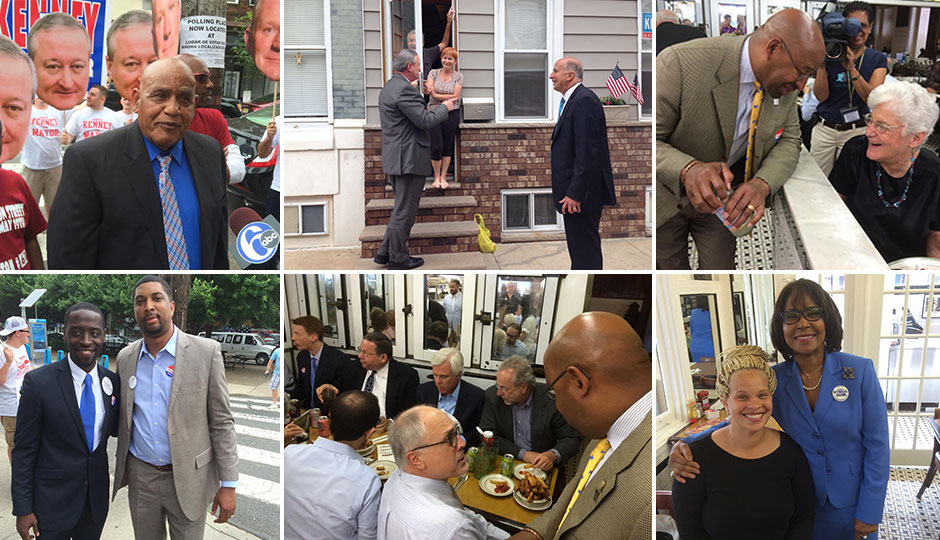Insider: 5 Election Day Lessons for Progressives

Photos by Malcolm Burnley and Holly Otterbein
(Editor’s note: This is an opinion column from a Citified insider.)
1. Bullet Balloting Works. Last week I argued that folks should vote only for one or two At-large Council challengers and withhold their votes from the rest: incumbents, and challengers they weren’t truly passionate about.
As it turned out, Helen Gym appears to have edged out sixth-place finisher Isaiah Thomas by only 1,100 votes, or less than one vote per division. She beat incumbent Wilson Goode Jr. and Democratic Party endorsed challenger Sherrie Cohen by fewer than two votes per division. Based on what I saw on social media and heard on the street, lots of Gym supporters bulleted her. She ran a great campaign, but it appears the bullet voting put her over the top.
Going into election day, Gym and Cohen were considered the Big Two progressive challengers, and it appears Gym prevailed in part because she inspired a degree of passion that drove many supporters to not cast most or all of their other four Council At-large votes. Cohen apparently didn’t inspire that level of devotion. And some Cohen supporters actively promoted the laudable but deluded conviction that bullet voting doesn’t work, and that they should instead cast all five votes to support as many progressives as possible.
Bullet balloting is further borne out by the fact that the “vote for all five spots” progressives’ dire predictions did not come true. They feared good incumbents would lose to “pro-business” challengers if we bulleted Gym and/or Cohen. But of the three pro-business candidates they fretted about, only Allan Domb won, and he did so the old-fashioned way, with lots of money. Likewise, two of the three incumbents progressives embraced, Bill Greenlee and Blondell Reynolds Brown, retained their seats, with Reynolds Brown coming in a very strong second place.
To put it another way, Domb didn’t defeat Wilson Goode Jr. because progressives withheld votes from Goode. In fact, Domb didn’t defeat Goode at all. Domb defeated Paul Steinke and Tom Wyatt: all three fit into the same basic mold, and Domb’s TV ads and ward money simply overwhelmed the other two. For his part, Goode suffered from poor ballot position, a lackluster campaign, and the presence of two personable, high-quality candidates who almost certainly cut into his base: Thomas, and Derek Green.
2. Ballot position matters. A lot. The coveted #1 ballot spot probably got Green 10-15,000 of his vote-leading 67,700 total. Conversely, incumbents Greenlee, Goode, and Ed Nielson placed fourth, seventh, and ninth in part because of poor ballot position.
3. Ignore Social Justice at Your Own Peril. No one should be happy when a good person like Paul Steinke loses a race. That said, his campaign seemed based on the assumption that he could win with conspicuously vague platitudes and an endorsement from Ed Rendell (the latter of which became meaningless when Rendell also endorsed Domb). Every campaign puts forth an argument, and Steinke’s seemed to be, “You like the Reading Terminal Market, and I look like a guy who knows about tax policy, so just trust me.” In the same vein, you can’t secure LGBTQ community support based only on identity: you have to speak clearly and strongly to issues of social justice.
4. Philly’s racial map has been weakened, but not destroyed. Jim Kenney carried Northwest Philly and North Philly, but Anthony Williams still won in Southwest Philly and West Philly west of Penn. Given that he lost by 27 points citywide, the fact that he won every ward in two large areas of the city shows that the racial math still applies to a degree. So too does Kenyatta Johnson’s surprisingly large margin over Ori Feibush in the 2nd District.
5. The real war is yet to come. When you strip away corruption and pay-to-play, as has largely been done in Philly over the last eight years, you don’t end up with a simple victory for good government. Instead, you end up with a cleaner political landscape dominated by two opposing forces: the liberal social-justice constituency, and the neoliberal business constituency, both laying claim to the mantle of progressivism.
Human beings are complex, so of course on the individual level many folks, including elected officials, feel allegiances to both ideologies. But this remains a very real division, perfectly exemplified by the election of Gym and Domb. She has good ideas about tax policy, and I’m sure he supports many social-justice positions. Still, it’s hard to imagine two more apt symbols for these two competing tendencies.
Whether you think it’s an issue of politics, culture, or just sensibilities, this division will only intensify in the coming years. It’s a version of the argument that’s been raging in the national Democratic Party, and in our country, ever since the New Deal-Great Society consensus fell apart amid the political and economic upheavals of the late 1960s and 1970s. It’s about time we had that argument in earnest here, in the birthplace of the republic.
Matt Ruben ran unsuccessfully in the Democratic City Council At-large primary in 2007. He lives in Northern Liberties.